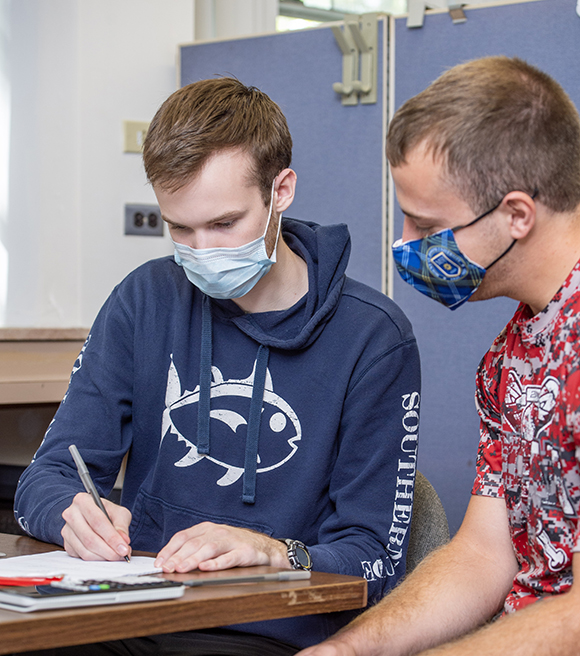COVID-19 had its impact on education, but the effort to recover pushes on.

The world has reached a point where, for the most part, we can finally start to call everything normal. With this comes the question of whether Covid-19 has dramatically impacted our lives permanently, and what normality truly is.
The pandemic was a major change in the lives of everyone. Businesses shut down, the economy slowed to a crawl, and education was moved to a virtual space, and this change didn’t appear to wield awesome results. Many students, such as myself, suffered from loss in motivation and engagement. At the time for me personally, I found online learning to feel unimportant, and harder to care about. That was back in 2020, but now it’s 2023, three years since the start of it all. That raise this question: Does it still have an impact on our learning like it did once?
I asked a handful of students at Mount St. Joseph University whether they still feel impacted by Covid, and I got quite a variety of results. For the most part, however, students agreed that everything is back to normal.
One student argued that while Covid no longer has an effect on learning, it made them lazier and disinterested in their in-person classes. Carrying on with that theme, another student said, “Covid has for sure made a difference in education. Hybrid learning is huge, and finding the motivation to go back has been really difficult. It is kind of like being reintroduced into society.”
Other students argued that it is more of a mentality: that if they believe it is affecting learning, then it will, claiming that such people are more likely to act out in a way that supports that idea.
Despite any disagreements, they all seemed to have thoughts on the mask policy. They didn’t have much of a stance on it one way or another, but agreed that the constant differences in policies made classes much less coherent and did make learning a little more difficult.
Intrigued by these different attitudes toward learning in 2023, I asked Dr. Laura Saylor, Dean of Education at the Mount, her opinion on the matter. In terms of the college level of education, since the pandemic Saylor has noticed an increase in comradery, stating that there appears to be “more motivation to connect with one and another.” Supporting this notion, she proposes that it’s likely because during the pandemic in high school people weren’t able to see each other quite as much, so now that people are experiencing a chance to be together we are instinctively trying to connect more to make up for the absence. In regards to grades and abilities she notes little change in college level students.
Curious, I asked her about younger children and the impact Covid may have had on them. Saylor said that from what she was hearing in the field of education, Covid-19 made a large impact on very young children, specifically those around second to third grade. She claimed that those years which would have been vital for their learning classroom procedures were largely removed and thus the students don’t quite know how to engage in contrast to previous students. Current young students aren’t ones to ask questions or show leadership as often, due to the limitations of online learning and participation via a screen.
Saylor then talked about middle school students, the ones that she is most worried about.
“Information from the State of Ohio says middle school children suffered some of the worst learning outcomes and will end up needing the most help catching up.” When asked why she believes this to be the case, she suggested that elementary schoolers oftentimes had the support from their parents and or guardians with their work, and high schooler students had become self-sufficient enough to be capable of keeping themselves on track. Middle schoolers, however, had reached a point where it may be harder for parental support, and they hadn’t yet reached a point where they were completely self-reliable.
Ultimately, Saylor concludes, in the college level there hasn’t been much of a change. High school level writing has so far remained about the same level as where it was pre-Covid. In cases when students are less prepared for college at the end of their high school career, Saylor believes that it will be up to colleges to meet and support them wherever they are.
Covid has made a real difference in education, one that will have effects that last for a very long time, such as the ideas of hybrid and virtual learning. But there may still exist many problems that we haven’t yet seen. The pandemic had a clear impact on education and learning as a whole, and many people are still recovering from its effects, but as we move forward we can help those who were impacted, and work towards a normalized society.

